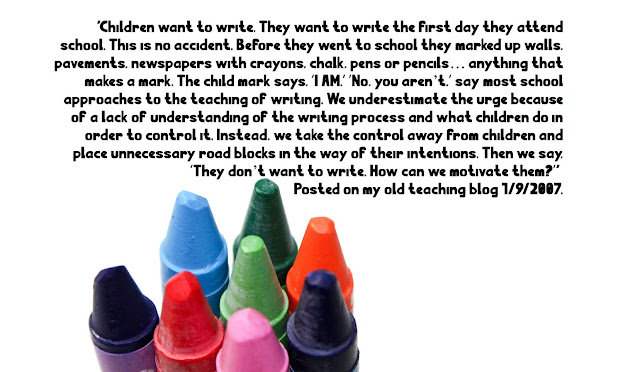A Writing Teacher is a Blogger.
*reading through the draft of what might be my next book*
This presentation comes out of frustration.
It finally occurred to me after reading Kinsey’s piece (and other pieces online regarding recording/reflecting one’s thoughts somewhere) that it was okay to have a teaching blog, to be a teacher who put her thoughts OUT THERE for public display. I knew it was okay, to a certain extent, before I found these articles and online postings by others, yet I didn’t have any evidence beyond the fact that it was working for me, so bugger off type of excuse/answer/reason.
Sure, some colleagues thought I was showing students how “human” I was which was detrimental, according to “them,” but, um, who cares? Aren’t all teachers human, really? And aren’t the best teachers those who bring a part of themselves into the classroom?
[If you are a teacher of writing, you should be a writer. Duh.]
I’m unsure why colleagues truly questioned why I had a teaching blog. During grad school, not everyone blogged once it became popular (2002ish, my second semester of grad school), but no one really questioned why I was doing it. And keeping a few blogs at that. I think I assumed that since I got a job in an English dept, current members would look at the blog and immediately see it’s benefits as I and others had. This was not the case.
Blogs get a bad rap, essentially.
They receive publicity for the wrong reasons. Some stalker found a young girl’s blog blahblahblah. Someone had a blog and blogged about their crappy job and then got canned blahblahblah. Blogs and all those other things that “teenagers these days do” is causing their writing skills to go down the drain. Things of that nature. There’s not much out there to cause people to connotate the blog as a good thing – something to be considered by all.
The funny fact is that more people probably should keep a blog (or a journal at least – whether it’s public or not) since we lose many stories, much knowledge, when someone passes on without having shared his/her story down to the next generation. Also, just as we learned in history classes, if we recall the past more, perhaps we’ll be less likely to repeat it – so recording that past as well as reflecting on it is key to one’s success in life… academically, personally, professionally, spiritually, and mentally.



Comments
Post a Comment